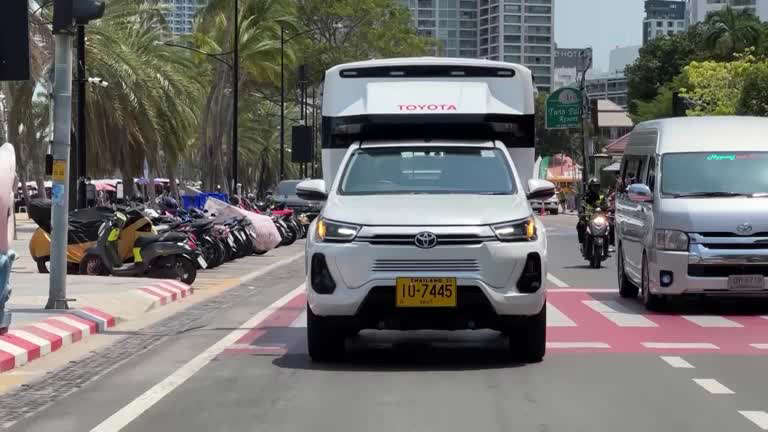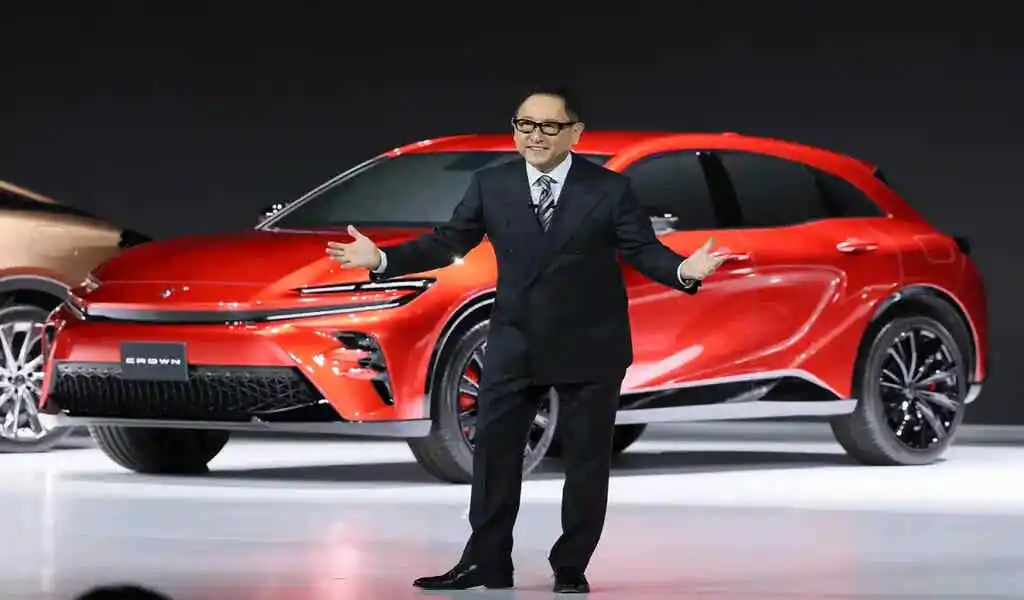Toyota has begun a public transportation pilot program in Pattaya Thailand with nine EV Toyota Revo pickup trucks, as battles China in the crucial Southeast Asian market. Chinese EV manufacturers are challenging Japanese automakers’ dominance.
Toyota Motor Thailand Executive Vice President Surapoom Udomwong said yesterday that the battery-electric Toyota Revo has been converted into Baht Buses (Song-Taews) for public transportation in the resort city of Pattaya, Thailand.
A procession of Toyota electric pickup trucks drove through the Thai beach resort of Pattaya, some 100 kilometers (62 miles) east of Bangkok, where the vehicles were deployed for fixed-route transportation.
The plan by the world’s top-selling automaker in Thailand coincides with Chinese EV firms’ increasing presence in the region’s auto assembly and export sector. For decades, Japanese automakers such as Toyota Motors, Honda Motors, and Isuzu Motors controlled Thailand’s auto industry.
However, government subsidies and tax breaks have prompted a flood of investment from China, with EV automakers investing more than $1.44 billion in Thailand.
Chery Automobile will be the eighth Chinese brand to invest in the country, following BYD, state-owned Changan Automobile, and Great Wall, the government announced this week. Toyota, which controls roughly one-third of the Thai market, will deploy a dozen electric pickup trucks to Pattaya.

“This is a memorable day,” stated the city’s mayor, Poramet Ngampichet. “Pattaya is a major tourist city for Thailand and so lowering pollution is important.” Poramet said he planned to convert Pattaya’s whole fleet of 700 song-taews to EVs.
Toyota had revealed plans to mass-produce the battery-powered Hilux pickup vehicle by 2025, but did not specify where they would be manufactured. Pickup trucks are popular in Thailand, accounting for over 50% of vehicle sales.
According to the Thai government, Isuzu intends to establish a plant in Thailand to manufacture the electric version of its D-MAX pickup truck for both domestic and export markets.
Thailand’s Domestic Vehicle sales see 30% drop in March
Domestic car sales in Thailand remained slow in March, decreasing by 29.8% year on year to 56,099 units, albeit the figure is marginally higher than the February total, according to the Federation of Thai Industries (FTI).
The 45th Bangkok International Motor Show, which took place between March 27 and April 7, was expected to boost car sales. In February, domestic car sales totaled 52,843. The March 2023 sales volume was 79,943 units.
According to Surapong Paisitpatanapong, vice-chairman of the FTI, the reduction is due to three major problems that have plagued the automotive industry since last year: stricter vehicle loan conditions from banks, a sluggish economy, and a delay in state budget expenditure for fiscal 2024.

“We still hope the situation will improve in the second half of this year, driven by more spending and investment from the state and business sectors, as well as tourism growth,” said Mr Surapong, who also serves as a spokesperson for the FTI’s Automotive Industry Club.
The House of Representatives approved the 3.4-trillion-baht budget plan for fiscal 2024 in March and is expected to have a special session next month or in June to discuss the budget law for the fiscal year 2025, which begins in October.
Bankers are wary about providing money to prospective car purchasers, particularly in the truck market, due to concerns about non-performing loans. Thailand’s household debt-to-GDP ratio is relatively high (91%), compared to an average of 60% in other emerging economies.
In March, sales of pure trucks and pickup passenger cars fell 45.2% and 46.6% year on year, to 16,212 and 3,436 units, respectively, according to Mr Surapong. From January to March, Thailand’s overall car manufacturing declined by 18.4% year on year to 414,123 units, with 140,443 cars produced for domestic sales and 273,680 units built for export.
Mr Surapong ascribed the decline to the necessity to import electric vehicles, as the country’s EV assembly factories are not yet ready for commercial operation.
“We believe the number of locally made EVs will increase in the third quarter,” he told reporters. The club had previously set a 1.9 million-unit target for Thailand’s vehicle production in 2024, a 3.1% increase over 2023.
Car exports were a crucial driving force for the automotive industry in March, up 7.1% from February to 95,089 units, however they fell 3.3% from March 2023.
Source: Reuters
The Toyota Battery Breakthrough Could Boost Electric Cars





